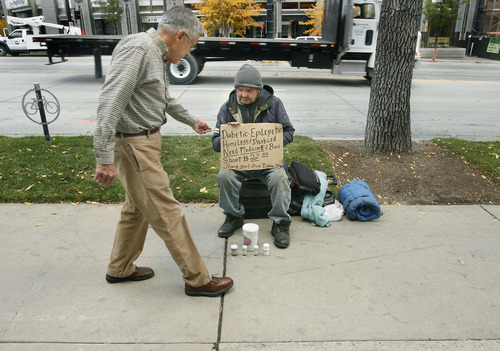This is an archived article that was published on sltrib.com in 2012, and information in the article may be outdated. It is provided only for personal research purposes and may not be reprinted.
A federal judge has declared unconstitutional a state panhandling restriction that outlaws a person from standing near a road to solicit money.
U.S. District Court Judge Ted Stewart made the ruling Thursday in response to a 2010 lawsuit filed by three homeless people in Salt Lake City who had been cited for panhandling and claimed the ban on begging for money violated their right to free speech.
Attorney Brian Barnard filed the suit on behalf of Terry Lee Wilkinson, Patty Eagle and Jackie Sanchez, who were asked by police to stop asking motorists for money.
Barnard's lawsuit lists Utah's governor, the state attorney general and the capital city's mayor and police chief as defendants.
Following the filing of the lawsuit, Salt Lake City in 2010 agreed not to enforce the state panhandling restriction.
The state defendants, however, refused to settle and asked the court to rule on the constitutionality of the statute.
In arguments before the judge on Tuesday, Barnard argued that valet attendants, tax services, restaurants, oil and lube and other businesses that hire people to wave signs, including Salvation Army bell ringers, also violate the statute — but police don't enforce the law against them.
Assistant Attorney Generals Jerrold Jensen and Paul Proctor argued that the panhandling prohibition addressed traffic and public safety concerns and the "evident dangers of physical injury and traffic disruption that are present when individuals stand in the center of busy streets trying to engage drivers and solicit contributions from them."
Stewart's ruling said that although the state has legitimate concerns in wanting to promote safety, it needs to find a way to do so without infringing upon First Amendment rights.
"The court does not dispute that the state has a legitimate and important interest in regulating conduct that occurs on busy roadways, and it may do so as long as the legislation is written so as to avoid infringing on constitutionally protected rights.
However, it may not do so through sweeping statutes that regulate conduct unrelated to the government interest," Stewart wrote.
"The language of the statute applies to all roads," Stewart added. "The prohibition therefore regulates a wide range of situations that likely have no impact on safety."
Barnard reiterated his beliefs following Stewart's order that the panhandling restriction violated his clients' constitutional rights — and those of others in the community.
"The statute was overbroad in that is outlawed much speech for no legitimate governmental reason. As noted in the court's decision, it was a crime for children to operate a lemonade stand next to a state highway in rural Utah. The valet parking services in front of restaurants were criminal in nature. Girl Scouts with a card table selling cookies on the sidewalk visible to passing motorists were breaking the law," Barnard said. "The statute also prohibited a person looking for work from standing on the side of the road with a sign saying, "Need work."
Barnard said laws are in place to make aggressive panhandling a crime and he believes those laws should be enforced.
His clients, he said, were innocently asking for money.
"The First Amendment protects the right for people to ask for help and to seek employment," Barnard said. "This [panhandling] statute, now declared unconstitutional, made innocuous, innocent conduct a crime."
Barnard said his clients are pleased they've won their right to ask for money. Barnard will ask the state of Utah to pay for attorneys fees and court costs in the case.
He said the judge's ruling means law enforcement can't now ticket homeless people targeting motorists for money with signs.
"All law enforcement in the state are now on notice that the statute is unconstitutional. If they enforce it in the future, they can be sued for money damages," Barnard said.
Jensen and Proctor could not immediately be reached for comment on Thursday.
mrogers@sltrib.com Twitter: @mrogers_trib



